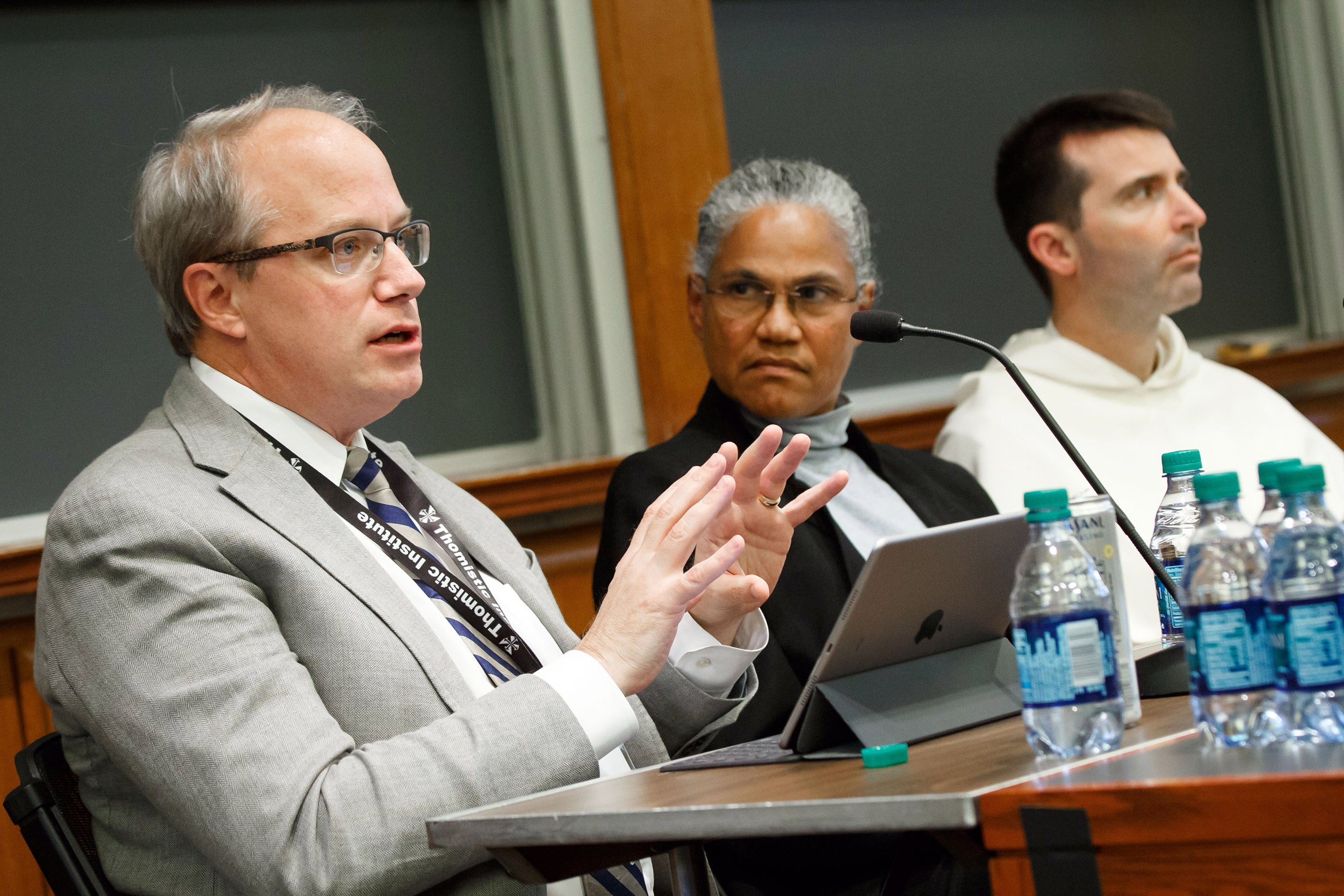A panel of legal and theological authorities came together at Harvard Law School to discuss the topic, “Christianity and the Common Good.” Presented by Harvard with the Thomistic Institute, which aims to promote intellectual Christian thought at universities, the conference brought together a number of guests including Supreme Court Associate Justice Neil Gorsuch ’91, who gave the keynote address. (Justice Gorsuch’s address was closed to the press.)
In one panel discussion, three distinguished guests—Fr. Dominic Legge of the Thomistic Institute, Adrian Vermeule’93, Ralph S. Tyler Professor of Constitutional Law at Harvard Law School, and Jacqueline Rivers, professor of African-American studies at Harvard University—explored the topic of the common good from the respective viewpoints of Christian philosophy, black cultural history, and political theory.
Fr. Legge began by exploring the definition of common good, and its relation with individual good. He began with a simple hypothetical: If he brought a pizza into the conference and started handing out slices, wouldn’t that benefit the common good?
Not, he said, according to Thomas Aquinas, who would note that one person’s slice would be taken from another. The true common good would benefit the community first, but it would also benefit the individual: “The common good is good of a higher order that an individual share as a member of the community. It is not private good, but it is good for the individual.”
True examples of the common good, he said, can be found in armies and sports teams, who put individual concerns aside to reach the goal of victory—yet the individual still benefits once that goal is reached. In a political system, he said, the common good is served when the state lives in accord with virtue, i.e. the laws of God. Thus, the state needs to recognize a higher law than itself. “We tend to think that limitations of the state’s power come from below—from the citizens. But Aquinas would say that the limits come from above. The highest possible end is that that we would share in God. And that’s not like a slice of pizza—It is something that grows from being shared.”
Professor Rivers looked at two eras when a community inspired by the Church worked for the common good—namely, the struggles for civil rights and for the abolition of slavery. The black community, she noted, is “deeply rooted in Christian faith,” and today 80 percent of black citizens claim a belief in God. In the time of slavery, abolitionists Frederick Douglass and Sojourner Truth were both motivated by their beliefs. “Douglass was a Christian who believed that God’s judgment would be enacted on the United States because of slavery. Sojourner Truth’s name referred [in part] to the calling to speak God’s truth. She was convinced, as Douglass was, that America was under judgment because of slavery. She often spoke in very Biblical terms and mixed that with humor; that was a very powerful language in the 19th century.”
The tradition, she said, continued with the Rev. Martin Luther King and the civil rights movement. “The church was the hub of the black community; it was a place to develop administrative and rhetorical skills. It was a place to become more human, and it was a power base. It was the place where people on the streets, who would be facing police dogs and water hoses, would meet to sing hymns in preparation.” Rivers also saw Dr. King’s advocating nonviolence as a profound example of Christian faith: “He was constantly being threatened, his house was bombed while his wife and daughter were at home. Imagine the faith it takes to adopt a position like that.” She did however acknowledge that both sides of an argument will often claim to have God on their side. “Slaveholders also argued from a Christian perspective. I don’t want to seem naïve enough to think that Christianity has not been perverted by those who claim to practice it.”
Professor Vermeule’s talk looked, not at the common good, but at the theory of what he called the “common bad”—an approach that he finds all too common in liberal constitutional theory. The theory, illustrated by Karl Popper’s 1945 work “The Open Society and its Enemies,” is that the aim of a constitutional society is to prevent a bad result, i.e. tyranny, rather than to promote a good one. Societies would allow for an intractable disagreement on the definition of the common good, but agree on the common bad. In a nutshell, he said, the theory is that “We can’t agree on the good, but we can limit authority to prevent the agreed-upon bad, and this will allow us to pursue our individual life plans.” Overall, this approach creates a “low-aspiration, negative exercise rather than a high-aspiration, positive one.”
According to Vermeule, this “common bad” approach is inherently flawed—in part because the bad is inherently privative and thus cannot be defined independently of the good, in part because tyranny itself often claims to promote the rights of the individual and to protect ‘tolerance’. Vermeule here quoted John Dewey: “Any claim for liberty is a claim for a certain distribution of power, to force others to act or not act in a certain way.” Thus, he said, the common good is not served merely by the avoidance of a common bad. “There is no way to tie tyranny uniquely to the invasion of autonomy in a way that liberal constitutional theory wants to.”
